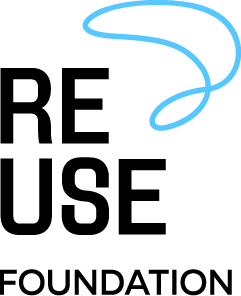Featured
SUPPORTING THE NOVEL REUSE SOLUTION IN INDIA, BEAT THE SACHET! |
|
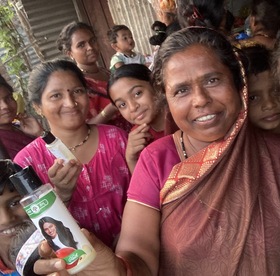
|
REUSE Foundation is excited to support Beat The Sachet, a novel reuse project working in India. In many low-income countries products are often sold in single doses packaged in plastic. These sachets cannot be recycled, they escape to waterways and are a primary cause of ocean microplastic. Approaching 1 trillion are used each year and use is strongly rising. It's been a scandal for years and major users like Unilever have been vilified but continue to increase plastic sachet sales. Little is being done to address this major environmental problem.
Beat The Sachet worked with low-income communities, mostly waste-pickers, to devise a reuse solution that would work for them. It tested the solution in a year-long pilot that went well. India Plastic Pact highlighted the project for its potential to scale in low-income communities and Beat The Sachet is ready to go to the next level. It approached companies such as Unilever and L'Oreal for funding but was declined. REUSE Foundation is excited to be able to support Beat The Sachet on its next step. Preparations are underway and Beat The Sachet 2.0 will launch early 2025. For more details or to help fund this project, click here[Image Credit: © LESS& Ltd.] |
Highlights
Plastic Recycling Firm Loop Industries Secures €35 Million Investment |
|
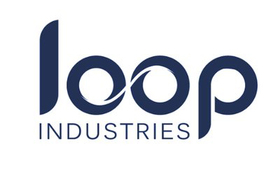
|
Loop Industries, a polyethylene terephthalate (PET) and polyester recycling company, and the European technology investment firm Reed Management, have signed an agreement for a €35 million investment from Reed to fund the Infinite Loop ™ technology with a 50/50 joint venture for European release. This is composed of a €10 million investment and a €25 million loan, which will allow the Loop technology to process low value PET and polyester waste to create a circular plastic production system.[Image Credit: © Owner Loop Industries, Inc.]
|
Nestlé Develops Limited Edition Plant-Based Fork |
|
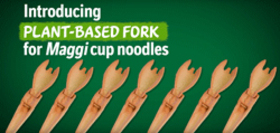
|
Nestlé has produced an edible fork from wheat flour and salt, as a limited-edition item for Maggi cup noodles in India, coming alongside increased paper straw usage as part of Nestlé’s commitment to reducing their plastic packaging. In China, Nestlé Nutrition is running a similar pilot for a paper scoop in adult milk powders as part of the research and development process to limit virgin plastic use.[Image Credit: © Nestle]
|
UK Packaging Company DS Smith Urges Tighter Plastics Regulation |
|
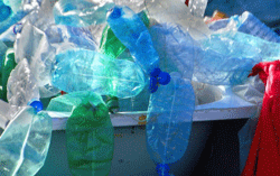
|
Packaging firm DS Smith has called on the incoming UK government to improve the regulatory framework around plastic packaging and consumption, in line with recent changes adopted by the European Union. Chief Executive Miles Roberts stated that changes in packaging, such as carboard fruit punnets, had removed 1.2 billion plastic pieces from DS Smith products, including over 270 million in the UK. This comes amid lower recycling rates in the UK and uncertainty over recycling plans under Rishi Sunak’s government.[Image Credit: © VIVIANE M. from Pixabay]
|
GoUnpackaged Aims To Standardize Refills Across The Supply Chain |
|

|
GoUnpackaged is working with Aldi and Ocado to standardize refills and remove single-use plastics from the supply chain. It aims to remove the need for supermarkets to perform novel tasks, such as cleaning refillable containers, and perform that themselves. It’s begun early trials. Using an open-source business model, it also aims to facilitate company-specific refill capacities, as well as reduce costs overall. GoUnpackaged also provides consultancy and policy advice and believes that job creation in novel refill processing is central to its potential for success, along with advocating for changes in the regulatory framework such as the PPWR (Plastic and Packaging Waste Directive) in Europe.[Image Credit: © GoUnpackaged]
|
Google Accelerates Plastic Pledge And Provides Blueprint To Others |
|

|
Google will beat its initial commitment to remove plastic packaging from its consumer electronics packaging by 2025 by 6 months and will release a 60-page document to help competitor companies achieve similar goals. Whilst their novel paper & fiber-based packaging is more expensive and required internal development to accommodate lifespan, drop dynamics and water resistance, Google believe that increasing scalability will mitigate that cost.[Image Credit: © Google LLC]
|
Unilever’s CEO Urges Governments To Do More To Secure Global Plastics Treaty |
|
.png?width=280)
|
Unilever’s CEO, Hein Schumacher, said there’s no time to waste in agreeing a Global Plastics Treaty. He talked during a plenary session at the latest round of negotiations, in Ottawa, on behalf of Unilever as a member of the Business Coalition for a Global Plastics Treaty. He later wrote that a treaty is “exactly what business needs”. He is calling on governments to level the playing field, saying that “business responds to regulatory certainty, but the reality is we are facing a hugely fragmented policy environment for packaging from country to country”. Hein says plastics reduction is the fastest way to cut plastic pollution, but “how the treaty will seek to reduce virgin plastic production remains unclear” and the same can be said for “how it will help scale reuse and refill models.” He was encouraged by progress in some areas but said “governments should prioritise discussions on upstream measures such as phasing out problematic and avoidable plastic products in a globally coordinated way, and harmonising design criteria for plastic packaging.” [Image Credit: © Unilever]
|
Reversing The Growth Of Ocean Microplastic Will Need Drastic Actions |
|
.jpg?width=280)
|
Researchers at Imperial College London and GNS Science found that reducing plastic pollution by 5 percent annually would stabilize levels of microplastics in oceans, but even a 20 percent reduction annually would not lower existing levels significantly. One of the authors. Zhenna Azimrayat Andrews, said: “there can never be a completely successful removal of microplastics from all depths of the ocean, we kind of just need to live with it now. But the current global output of plastic pollution is so great, that even a 1% annual reduction in pollution would make a big difference overall.” [Image Credit: © Lucien Wanda from Pexels]
|
Sachets Are Major Environmental Problem, But Little Is Being Done About Them |
|
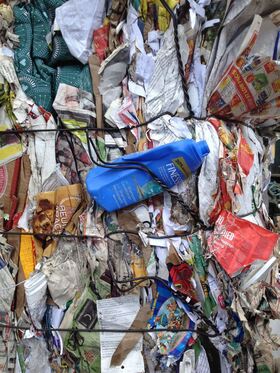
|
Research suggests that over 850 billion small plastic sachets containing small amounts of products from personal care goods to condiments are sold each year. They are largely targeted at low-income markets, with Southeast Asia contributing around half. The number could reach some 1.3 trillion within four years. Sold on their affordability and convenience benefits, they are however a major environmental issue: they are made from a lamination of different materials, making them close to impossible to recycle economically at scale. Instead, they are often discarded, ending up in landfill or clogging waterways.
An audit by BreakFreeFromPlastic, covering 50 locations in India, Indonesia, the Philippines and Vietnam between October 2023 and February 2024, collected over 33,000 sachets, attributed to 2,678 brands. 86 percent were food items. Major producers include multinationals like Unilever, Procter & Gamble and Nestlé, as well large regional brands. One waste picker in India says sachets are practically impossible to collect because they are so small, and they are worth little even if collected. In The Philippines, the culture of refill, called “tingi” in the country, is re-emerging. Aloja Santos, founding president of the Philippine National Waste Workers' Alliance, says refill should be encouraged by banning sachets and incentivizing reuse and refill.[Image Credit: © Vivianne Lemay on Unsplash] |
WWF Publishes A Blueprint For Companies To Act Credibly On Plastic Pollution |
|
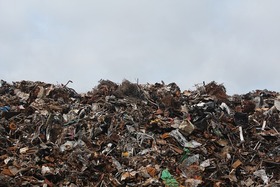
|
The World Wildlife Fund’s Blueprint for Credible Action on Plastic Pollution aims to guide companies in moving from awareness efforts and commitments to measurable progress. It outlines four steps: understand the crisis and set ambitious goals; transform the company’s plastic footprint; advocate with others for system change; and invest in circularity beyond the company’s direct operations. WWF says the outcomes would include: better data and data harmonization, making collaboration with regulators and investors easier; targeted plastic pollution actions within the company’s direct control; readiness to advocate with other companies, stakeholders and policymakers; and product portfolios that are envisioned and designed for a just and equitable future. [Image Credit: © Pexels from Pixabay]
|
UK Retailer Set To Use Polytag Plastic Tracing System At Scale |
|
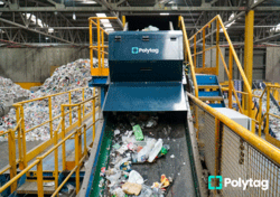
|
UK retailer Marks & Spencer and recycling technology company Polytag are collaborating on systems that trace what happens to its plastic packaging once used by consumers. An invisible tag can be read by electronic scanners at recycling centres. Tagged products will start to hit the M&S shelves by the end of the summer. Other retailers investing in Polytag include The Co-op, Aldi and Ocado, but the M&S scheme will be the first full-scale use. Polytag aims to have the system at 12 sites or more, accounting for half of all single-use plastic household waste recycled in the UK, within a year, with a longer-term plan for 48 UK sites, or 95 percent household waste recycling. Moves like these are possible ways of addressing the incoming extended producer responsibility regime. [Image Credit: © Polytag]
|
PureCycle Pays $13 Million To Settle Shareholder Complaint |
|
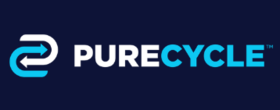
|
Polypropylene recycling company PureCycle Technologies Inc. in Ohio has settled a lawsuit for $12 million. The suit alleged that PureCycle misled shareholders and the proposed settlement, in the US District Court in Orlando, Fla., will cover any person or entity that purchased or acquired stock between November 2020 and November 2021. Plaintiffs said that company statements about its polypropylene recycling process and its management's business experience "artificially inflated the price of PureCycle securities, and that the securities' prices dropped in response to certain subsequent disclosures". PureCycle’s solvent-based technology, developed by Procter & Gamble and licensed to the recycler, cleans used polypropylene and returns it to virgin quality. [Image Credit: © PureCycle Technologies, Inc.]
|
UK’s KinKind Plastic-Free Beauty Brand Hopes To Raise $500K |
|
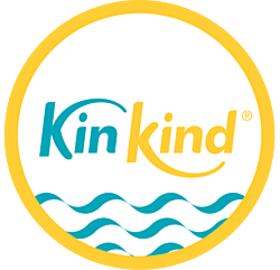
|
KinKind, a eco-friendly hair and beauty brand in the UK, is seeking to raise £500,000 help it deliver its mission to make beauty plastic free. It makes and sells plastic- and water-free hair and beauty care products. Founder Victoria Coe has over 20 years of experience in FMCG marketing; channel growth is led by Paul Brown, who used to work for Reckitt and Douwe Egberts as sales director. Plans for the funds include new product development, as well as team expansion, channel growth into retail, new product categories and new packaging design. [Image Credit: © KinKind Ltd] |
SC Johnson Outlines The Refill And Reuse Approach To Tackling Plastic Waste |
|
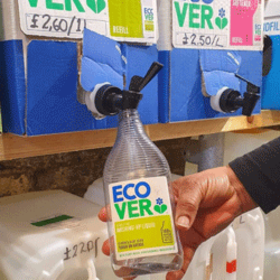
|
According to an SC Johnson article, refilling and reusing containers is not just a nostalgic trend from the past but is gaining momentum among a new generation as a way to combat packaging waste. Citing the World Economic Forum, it said half of global plastic production is single-use and that reusing just 10 percent would reduce by half the amount of plastic waste reaching oceans. It also mentioned an Ellen MacArthur Foundation study that found widespread use of returning and reusing plastic packaging could cut greenhouse gas emissions by over two-thirds. A shift towards refilling and reuse options is gaining traction due to its potential to significantly cut down on plastic waste and greenhouse gas emissions. Governments are taking notice and businesses are taking action, with initiatives like dedicating shelf space to refill options or introducing reusable programs to encourage adoption. SC Johnson is among companies exploring different approaches such as Refill at Home, Refill on the Go, Return to Store, and Return from Home to unlock the potential of refill and reuse strategies. Despite consumer interest, the transition to refill and reuse has faced challenges such as convenience culture, the gap between consumer intent and action, cost factors and complexities in the supply chain. Overcoming these hurdles requires collaboration among consumers, businesses as well as governments to drive systemic changes towards a culture that prioritizes long-term benefits over the short-term convenience of plastic.[Image Credit: © S.C. Johnson & Son Inc.]
|
Polythene UK Starts Mobile Plastic Waste Collection Program In England |
|
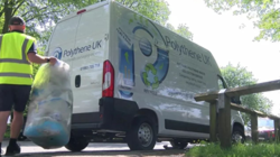
|
Polythene UK launched a mobile plastic waste collection program in England. The packaging company uses a van equipped with an onboard compactor to collect and compress the polythene waste. Minster Lovell-based Spar joined the plastic waste collection scheme.[Image Credit: © Polythene UK Ltd] |
AVON Works With Amcor To Launch Refill Pouch In China |
|
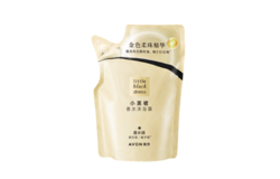
|
AVON and Amcor partnered to launch the AmPrima™ Plus refill pouch for AVON’s Little Black Dress shower gels in China. The new packaging reduces the carbon footprint by 83% and decreases water and renewable energy consumption by 88% and 79%, respectively, when recycled. The AmPrima refill pouch matches barrier properties, stiffness, and graphics performance of non-recyclable alternatives. The company has plans to introduce similar solutions for other products, including its Shimmer Shower Gel later this year. AVON aims to use 100% reusable, recyclable, or compostable packaging and use 50% recycled content in all its plastic packaging by 2030. [Image Credit: © Amcor plc]
|
Supermarkets Criticized for Inconsistent Recycling Labels Post-REDcycle Collapse |
|
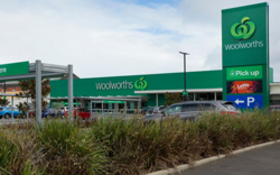
|
In Australia, Coles and Woolworths are facing backlash for continuing to use outdated recycling instructions on their soft plastic packaging, despite the REDcycle program's collapse in 2022. This program allowed customers to return soft plastics to these stores for recycling. The outdated labels have caused significant consumer confusion, with mixed messages on whether to bin or recycle the plastics. Both supermarkets announced plans to update their packaging with new "Check Locally" or "Bin" logos, but progress has been slow. Critics argue that this delay erodes consumer trust and constitutes greenwashing. The Australian Packaging Covenant Organisation (APCO) introduced new recycling guidelines in July 2023, but manufacturers have until July 2025 to fully comply. Meanwhile, trials for a national curbside soft plastic recycling scheme are ongoing.[Image Credit: © Woolworths Group Limited]
|
EarthEcho International And SC Johnson Introduce First Group Of Marine Plastics Ambassadors |
|
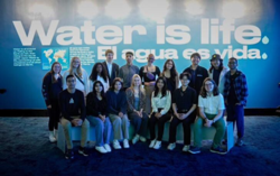
|
EarthEcho International and SC Johnson launched the Marine Plastics Ambassadors, a group of 22 young campaigners from the United States and Canada tasked with developing and implementing anti-plastics pollution campaigns and projects in their communities. Youth ambassadors, aged 16-22, will develop and implement local projects to reduce plastic waste. The program kicked off in Chicago, where participants explored The Blue Paradox exhibit, a collaborative effort by SC Johnson and Conservation International. This initiative addresses the statistic that 22 million tons of plastic enter the Great Lakes annually, contributing to a global crisis with severe impacts on marine ecosystems.[Image Credit: © PRNewswire / EarthEcho International]
|
Businesses Call For Legally Binding Global Plastics Treaty |
|
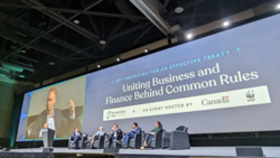
|
The Business Coalition for a Global Plastics Treaty supports a legally binding global treaty against plastic pollution. Unilever, together with the more than 200 member companies and organizations believe that voluntary recycling and other plastic waste reduction efforts are not enough to address the global problem. Businesses by nature prefer regulatory certainty, something that today’s uncoordinated policies by most governments cannot provide.[Image Credit: © Unilever]
|
Colgate Says It May Miss 2025 Plastics Targets |
|
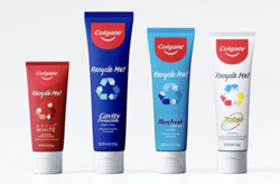
|
Colgate-Palmolive acknowledges potential delays in meeting its 2025 packaging circularity goal due to challenges in converting flexible bags and pouches. In its 2023 sustainability report, the company reveals progress of 89.5% towards the target, with difficulties noted in packaging for Hill's pet food and personal care items. Despite achieving milestones like reducing virgin plastic use by 21.4% and implementing 18% post-consumer recycled plastic content, Colgate faces obstacles in making all packaging recyclable, reusable, or compostable. Additionally, the transition to recyclable toothpaste tubes, covering 90% of North American SKUs, faced hurdles, including consumer lawsuits disputing recyclability claims. Colgate's journey reflects broader industry struggles in adopting environmentally friendly packaging solutions amidst evolving consumer demands and regulatory landscapes.[Image Credit: © Colgate-Palmolive Company]
|
Cleantech Group Advocates for Bioplastics and Advanced Recycling to Curb Emissions |
|

|
According to Cleantech Group, bioplastics and advanced recycling technologies hold promise for reducing the environmental impact of the plastics industry, which is on track to reach $1 trillion annually. Bioplastics, which are biodegradable and offer near cost parity with traditional resins, can reduce a product’s carbon footprint by nearly half. Although the production of bioplastics is expected to grow 3.5 times by 2028, it will still only make up 1.8% of total plastics production. The US leads in bioplastics production, with Thailand as a surprising second. Cleantech also promotes advanced recycling technologies which, unlike mechanical recycling, can process all plastic types, increasing recycling rates from 8% to potentially over 30% by 2040[Image Credit: © CTG:1 LLC]
|
Consumer Survey Shows Strong Support for Reuse and Refill Initiatives in UK |
|

|
A March 2024 survey by City to Sea and Obsurvant highlights growing concern among UK consumers about plastic pollution and their support for reuse and refill initiatives. The survey, with 2,037 respondents, found 83% of participants are worried about the plastic in their weekly groceries, and a similar percentage report feelings of anxiety and frustration about plastic waste. The results show a significant increase from 2021. Additionally, 82% of respondents believe brands should do more to reduce packaging and promote reusable options, while 76% think the government should prioritize tackling plastic pollution.[Image Credit: © City to Sea] |
